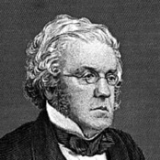
works, particularly Vanity Fair, a panoramic portrait of English society.
Thackeray, an only child, was born in Calcutta (the capital of the British Indian Empire at the time, in the grounds of what is now the Armenian College & Philanthropic Academy – on the old Freeschool Street, now called Mirza Ghalib Street), India
, where his father, Richmond Thackeray (1 September 1781 – 13 September 1815), held the high rank of secretary to the board of revenue in the British East India Company
.
Let the man who has to make his fortune in life remember this maxim. Attacking is his only secret. Dare, and the world always yields: or, if it beat you sometimes, dare again, and it will succumb.![]()
What money is better bestowed than that of a schoolboy's tip? How the kindness is recalled by the recipient in after days! It blesses him that gives and him that takes.![]()
The wicked are wicked, no doubt, and they go astray and they fall, and they come by their deserts: but who can tell the mischief which the very virtuous do?![]()
Good humour may be said to be one of the very best articles of dress one can wear in society.![]()
Stupid people, people who do not know how to laugh, are always pompous and self-conceited. ![]()
Except for the young or very happy, I can't say I am sorry for any one who dies. ![]()

